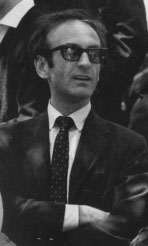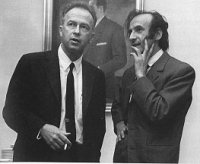 |
 |
 |
Elie
Wiesel is probably the most famous survivor of the Holocaust. He
was born on September 30, 1928 in Sighet, Romania. In 1944, the Jewish
community that Elie had grown up in was forced into ghettos by the Nazis
and later they were deported to the death Auschwitz-Birkeneau. Wiesel's
mother and sister were sent to the gas chambers. He was not selected
so he stayed and did forced labor. Wiesel never wrote any stories
while at the death camp. He was hoping he would be able to
make it through the war in the death camps.
Wiesel was only fifteen years old when he and his family were sent to the
death camps. Wiesel would spend the remainder of the war in the camps
of Auschwitz, Buna, and Bergen Belsen camps. When the war was over,
Wiesel was hospitalized for many weeks because he had severe malnutrition
but a Norwegian doctor kept him alive. After recovering, he resumed
his education. After Wiesel's Holocaust experience, he promised himself
not to speak of his Holocaust experience for ten years. An older
author convinced Wiesel to tell his story.
After that, Wiesel wrote an eight hundred page manuscript in Yiddish on
his Holocaust experience. This book was called Night, his most famous
book on the Jews and their Holocaust experiences. When Night was
published he then wrote two other very famous books called Dawn, and The
Gates of the Forest. These books were called Wiesel's trilogy.
One of Wiesel's famous quotes is '' to remain silent and indifferent is
the greatest sin of all.'' Wiesel is the conscience of his generation
with no question. Wiesel was the leader of the Jews. Another
one of his famous quotes is '' no one has the right to speak for the dead.''
Wiesel has written nearly three dozen books dealing with Judaism, the Holocaust,
and the responsibility to fight hatred, racism, and genocide. He
is a very religious man. Elie Wiesel is very important because he
spoke about the hard experiences that many Jews couldn't do. The
book, All Rivers Run to Sea is the first book that puts the events of his
life in comprehensive perspective.
In 1956 Wiesel made a decision to become a U. S. citizen. In
1978, Wiesel was appointed Chairman of the United States Holocaust Memorial
by President Jimmy Carter. Elie Wiesel is famous because of his writing
and surviving the Holocaust. He is a great author and a writing genious.
In 1985, Wiesel was awarded the Congressional Gold Medal of Achievement.
He is considered the leading voice of all the survivors. His books
describe the Holocaust and tell of some of the horrors that he witnessed
at the death camps. Most of his books are different in at least one
way. He believes that the survivors will always suffer because of
the indifference of the world. One of the lessons of his writings
teaches people '' to distinguish between what we need to understand and
what we should not attempt.'' Night was his most famous book because
it penetrated inside experiences of Jews within the concentration camps.
Since 1976, Wiesel has been the Andrew Mellon Professor of Humanities at
Boston University.
Wiesel's stories will help young children that are Jews understand what
has happened in their heritage and many of their ancestors. Elie
Wiesel stated that there is a '' need to lay the sufficient blame on the
world of the living, as a kind of penance for the dead, a world that then
as now never acknowledged its portion of responsibility.'' Elie Wiesel
was a teacher to many and also just a writer to many, but to the Jews he
was both. He taught them to speak of their experiences and let their
emotions of this tragic situation our. He also taught them to stand
up for themselves. This is why in 1986, Elie Wiesel won the Nobel
Peace Prize. As of right now, Wiesel lives in New York City with
his wife and son, and he continues to write and speak around the world.
By Cole Manbeck
Sources
Elie
Wiesel bio: xroads.virginia.edu/~cap/holo/eliebio.htm
Elie Wiesel: english.cla.umn.edu/courseweb/1591/students/eliewiesel/eliewiesel.html
Elie
Wiesel Page:
www.oll.temple.edu/ih/ih52/novels/wiesel/wieselframeset.html